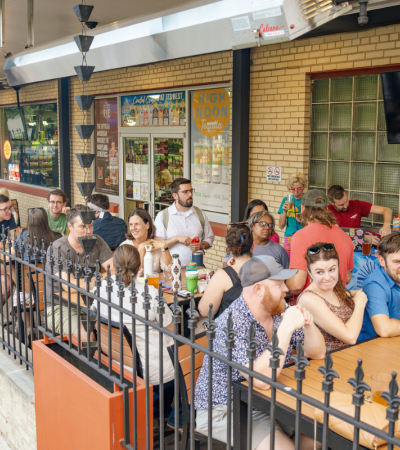Tweens (10-12)
Adults
Intergenerational
Creating Connections: Intergenerational Book Club
Free
The Intergenerational Book Club is designed to create cross-generational connections where two different age groups can speak on an equal footing. Moderated by a librarian, participants from local middle schools and retiree volunteers from our partner organization meet across four weeks to discuss a middle grade or YA title. We meet on Zoom for an hour each week, discussing the book in sections. The final week is a wrap-up session and presentation of “reflection” projects.
The program's primary goal is to make meaningful connections between the generations. Students also gain evaluative and group discussion skills that can enhance their educational achievement.
Advanced Planning
Planning begins at least two months before the first session: book selection, coordination with the partner organization for the assignment of adult volunteers and recruitment of middle schooler participants.
Considerations for book choice include availability across the library system, as well as genre, gender identity of author and characters, length and publication date. We gather support materials and reader guides as aids to encourage conversation, especially in the first week or two when students can be reluctant to speak up.
Marketing
Our partner uses the Montgomery County Volunteer Center to recruit students, posting about a month before the first meeting date. We post flyers in our branch and recruit by word of mouth, as well. Student Service Learning (SSL) hours are granted to the students as an incentive. Our partner organization awards these due to the library’s restrictions on the age of volunteers.
Due to the limited number of participants, we have not used our library’s online calendar of events. Signups vary due to time of year and afterschool commitments, so we have had various successes with student numbers; however, the book discussions are typically worthwhile no matter the group size.
Budgeting
This is a no-cost program to plan.
Day-of-event Activity
We use Zoom to host the discussions, using the same link each week to avoid confusion. We are mindful to send out email reminders early enough that everyone understands what is required of them, and then again the day before and the day of to remind them to show up promptly for the weekly discussion.
Depending on how many students register, we often host two separate simultaneous groups, moderated by one librarian each. While we are confident that continuing this as a virtual program is the best option for the convenience of our participants, both students and seniors, we have occasionally encountered connectivity issues that can hamper the flow of discussion. We have begun to offer hotspots to participants who have issues with internet stability.
Program Execution
We have been running this program quarterly since July 2020, making changes to the time of day and length of meetings. It was determined best to only recruit middle schoolers. The smallest group we've hosted had four students, two retirees and a librarian, which is the minimum to do a discussion. Larger groups have had 14 students broken into two separate discussion groups, which we have found to be the maximum size for us. We always try to have more students than adults.
The point of our intergenerational grouping is to foster connection and communication, using a book as a springboard into deeper discussion. Because we break the book into sections, we find there is ample time to talk about the plot, characters and the bigger issues of a story. Even if the first meeting is quiet, there is time for the kids to get comfortable chatting. We have been pleasantly surprised during every discussion with the students’ insights and what topics they choose to focus their reflection pieces around.
We meet frequently with members of our Central Programming Team to discuss how recent programs have gone and if we need to make changes. We provide a survey link at the end of each set of discussions for participants to respond with feedback. Everyone agrees this is a worthwhile program where they learn something and gain skills. We also ask if the virtual format should be continued, and so far, meeting online is always preferred by both age groups for its ease of access and flexibility, particularly around afterschool activities. The best evidence we have that this is a successful program that appeals to students is that many have returned for future discussions.
Advice
While this program has proven to be a good way to allow two age groups to learn about each other in a shared activity, we have found it is important to remember that no one is the expert. We remind the adults to meet the students on an equal footing and encourage the students that their opinions are essential for a productive conversation.
For younger participants, the program gives them the agency to speak with adults as equals, something they may not experience elsewhere in their lives. For the adults, they get a window into the world of middle schoolers and the chance to influence their growth. We always emphasize that this is not a class, and the reflection piece should not be a book report.
Our model didn’t seem to work well for high school-aged students. We attempted a couple of more advanced YA titles early on and found it hard for teens to sustain their attendance.
Adults who participate should have patience and some general understanding of middle school minds.



